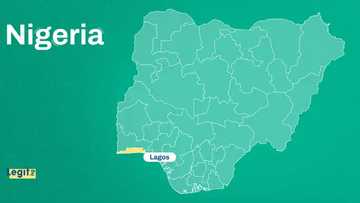Funding, Infrastructure, Talent; The Big Challenges Facing Nigerian Startups - Precious Adesina-Ola
Legit.ng journalist Victor Enengedi has over a decade's experience covering Energy, MSMEs, Technology and the Stock Market.
Precious Adesina-Ola is an accomplished business leader with over a decade of expertise in commercial management, tech sales, and growth marketing across various industries, including SME, FMCG, Automotive, Logistics, and FinTech.
She holds a certification from the Chartered Institute of Marketing (CIM UK) and has completed an entrepreneurship program at Pan Atlantic University, Lagos.

Source: UGC
Her career includes leadership roles at multinational companies like Diageo, Unilever, and Suntory, as well as tech startups such as Cars45 and Sendy Fulfilment Company.
Currently a leader at Suplias, a fintech firm focused on B2B commerce, Precious is driving growth by developing lending and financing solutions for African businesses. Beyond her corporate roles, she advocates for scaling startups and conducts training to improve tech sales strategies.
In this exclusive interview with Legit.ng, Adesina-Ola discusses startups, the Nigerian tech ecosystem, financial inclusion, and more.
What innovations in fintech are currently driving financial inclusion in Nigeria, and how can these be expanded?
Innovations like mobile money, agency banking, retail inventory financing, and digital lending platforms are critical drivers of financial inclusion. Solutions such as Obtainly Financing enable small businesses like FMCG value chain traders, particularly women traders, to access funding.
Further expansion can come through partnerships with stakeholders such as the telcos for wider reach, the manufacturers in the FMCG value chain, offering tailored financial education to boost adoption and even leveraging blockchain technology for transparency.
What technologies or sectors hold the most promise for transforming Nigeria’s economy?
Fintech, Agritech, and renewable energy are key. In fintech, embedded finance can integrate financial services seamlessly into B2B commerce, retail, and other sectors.
Renewable energy technologies will be good to drive the growth of the infrastructure upon which many other industries, fintech and agritech inclusive, can thrive, while agritech innovations can directly affect the Nigerian people's lives, boosting productivity and supply chain efficiency, creating ripple effects across the economy.

Read also
After introducing tool to secure customers’ fund, OPay wins financial inclusion innovation award
What are the biggest challenges Nigerian startups face today, and how can they be mitigated?
The challenges include limited funding, infrastructural gaps, and talent acquisition and retention. I’ll stop at these three. However, startups can mitigate these by exploring other funding models like revenue-based financing, milestone scaling, building remote teams which enable them to attract global talents, and even collaborating with government/private initiatives for infrastructure improvements when the opportunities present themselves.
How do you envision the Nigerian tech ecosystem evolving over the next five years?
The ecosystem will likely see deeper entrance into the fintech sector and B2B platforms addressing trade and supply chain inefficiencies. More startups will focus on adapting to solve local problems while figuring out how to navigate regulatory obstacles will definitely birth new innovations.
Also, considering that both local and International elections are over, we may see an increase in foreign investments as well as the growth of local VCs.

Read also
Empowering farming's future: BATN Foundation awards N10m to transformative agribusiness leaders
How can startups bridge the gap between rural communities and formal financial systems?
I am glad because this is already happening locally and is, in fact, already working. In some rural communities in Nigeria, some fintech startups have leveraged agent networks like the USSD technology, and some have also partnered with cooperatives to organise financial literacy and savings schemes.
More Fintechs can still play here by offering services in local dialects and providing flexible repayment models suited to informal income patterns. Continuously building trust through grassroots sensitization and campaigns is essential for this bridge to be further bridged.
What unique strategies or business models should Nigerian startups adopt to scale globally?
While I believe that problems are better solved for the familiar, the familiar can still give some insight into what is happening elsewhere. Nigerian startups should focus on creating adaptable products for diverse markets within the African continent while leveraging diaspora networks for insights and market entry. Emphasizing robust customer support, compliance with international standards, and strategic partnerships will ensure global scalability.
What strategies can startups employ to deal with funding gaps, especially at the growth stage?
While collaborating with accelerators can provide both funding and mentorship, as mentioned earlier, Nigerian startups can diversify funding sources by exploring revenue-based financing.
Crowdfunding is also an option, especially if done with integrity, the people can key into the vision of the business and the purpose of the raise.
Grants are another option, but they should never be the sole source of financial or cash flow sustenance for any business. Startup businesses should establish strong unit economics and showcase consistent traction that can attract growth-stage VCs.
How can Nigerian startups overcome infrastructural challenges like unreliable power supply and limited internet pen*tration while scaling?
As a startup that wants to play the long game, it should consider investing in alternative power solutions like solar energy and working with offline channels like agent networks to expand its reach.

Read also
As Nigerians await Tinubu’s budget presentation to NASS, CSOs list 6 key demands on education
Additionally, adopting low-bandwidth and offline-first technologies can make products more accessible in underserved areas.
How can the government create a more enabling environment for startups to thrive?
Let us start with the basic things, like creating an environment that encourages young entrepreneurs to do business easily. For example, the government should simplify business registration, reduce taxation for early-stage startups, and invest in digital infrastructure.
Setting up innovation hubs and offering grants for startups addressing critical socio-economic challenges like food, housing, and education can also foster growth.
What policy changes or incentives would you suggest to encourage investment in Nigeria’s tech ecosystem?
Tax breaks for tech investors and startups and also providing access to foreign exchange for startups are crucial to minimize the impact of inflation eroding the profitability of these early-stage startups.
Additionally, regulatory flexibility should be introduced to enable startups to test innovative solutions and create startup-friendly policies that can continuously build investor confidence.

Read also
FG launches N20bn loan scheme for Nigerians to acquire Innoson, other locally-assembled vehicles
PAY ATTENTION: Сheck out news that is picked exactly for YOU ➡️ find the “Recommended for you” block on the home page and enjoy!
Source: Legit.ng




